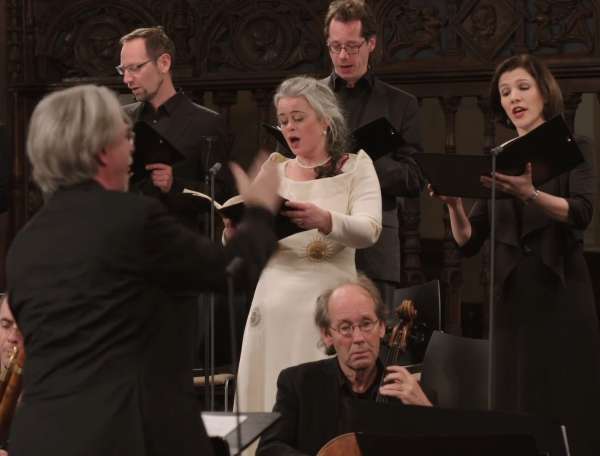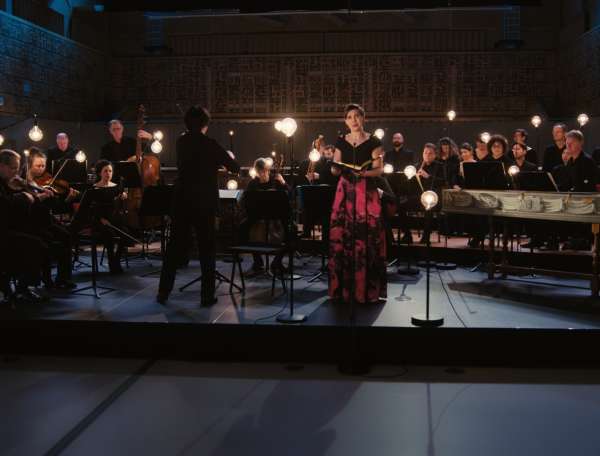

Herz und Mund und Tat und Leben
BWV 147 performed by the Netherlands Bach Society
conducted by Marcus Creed
Grote Kerk, Naarden
Behind the music
Out of the shadows
Does the overfamiliar demand all the attention? Then leave it out for once
Can music become too famous? If that is the case anywhere in Bach’s two hundred cantatas, then it probably applies to the gently rocking chorale Wohl mir, daß ich Jesum habe, from the cantata Herz und Mund und Tat und Leben. Already in 1909, it featured separately from the rest of the cantata, with the English words Jesu, joy of man’s desiring, as the set number for a music competition in England. It was soon to be found everywhere – in its original form, but more often as a piece for organ or piano. The cantata itself thus gradually disappeared from view.
Bach’s famous chorale was first heard when the cantata was performed in Leipzig, on 2 July 1723, for the Feast of the Visitation. It was during Bach’s first months as cantor and he reused music that he had to hand, as he often did. Bach had already written most of BWV 147 in 1716, as an advent cantata for the court chapel in Weimar, but it was only in Leipzig that he added the recitatives with instrumental accompaniment and the well-known chorale. So Bach turned a concise cantata (opening chorus, four arias and probably a simple closing chorale) into a big two-part cantata.
But if the fame of that chorale should overshadow the rest too much, just try it without for once. The recipe for the earliest version of the cantata from 1716 is: remove the recitatives, remove the two chorale harmonisations, swap over the soprano and tenor arias, think up different words for the bass aria (‘Lass mich der Rufer stimme hören’) and close with the sixth strophe of the chorale Ich dank dir, lieber Herre (e.g. BWV 347 or 348). Let the result sink in, repeat it a couple of times, and then the expanded version of the cantata will sound like new.
With support from
Stichting Zabawas
Extra videos
Vocal texts
Original
1. Chor
Herz und Mund und Tat und Leben
muß von Christo Zeugnis geben
ohne Furcht und Heuchelei,
daß er Gott und Heiland sei.
2. Rezitativ (Tenor)
Gebenedeiter Mund!
Maria macht ihr Innerstes der Seelen
durch Dank und Rühmen kund;
sie fänget bei sich an,
des Heilands Wunder zu erzählen,
was er an ihr
als seiner Magd getan.
O menschliches Geschlecht,
des Satans und der Sünden Knecht,
du bist befreit
durch Christi tröstendes Erscheinen
von dieser Last und Dienstbarkeit!
Jedoch dein Mund und dein verstockt Gemüte
verschweigt, verleugnet solche Güte;
doch wisse, daß dich nach der Schrift
ein allzuscharfes Urteil trifft!
3. Arie (Alt)
Schäme dich, o Seele, nicht,
deinen Heiland zu bekennen,
soll er dich die Seine nennen
vor des Vaters Angesicht!
Doch wer ihn auf dieser Erden
zu verleugnen sich nicht scheut,
soll von ihm verleugnet werden,
wenn er kömmt zur Herrlichkeit.
4. Rezitativ (Bass)
Verstockung kann Gewaltige verblenden,
bis sie des Höchsten Arm vom Stuhle stößt;
doch dieser Arm erhebt,
obschon vor ihm der Erde Kreis erbebt,
hingegen die Elenden,
so er erlöst.
O hochbeglückte Christen,
auf, machet euch bereit,
itzt ist die angenehme Zeit,
itzt ist der Tag des Heils:
Der Heiland heißt euch Leib und Geist
mit Glaubensgaben rüsten,
auf, ruft zu ihm in brünstigem Verlangen,
um ihn im Glauben zu empfangen!
5. Arie (Sopran)
Bereite dir, Jesu, noch itzo die Bahn,
mein Heiland, erwähle
die gläubende Seele,
und siehe mit Augen der Gnaden mich an!
6. Choral
Wohl mir, daß ich Jesum habe,
o wie feste halt ich ihn,
daß er mir mein Herze labe,
wenn ich krank und traurig bin.
Jesum hab ich, der mich liebet
und sich mir zu eigen gibet;
ach drum laß ich Jesum nicht,
wenn mir gleich mein Herze bricht.
7. Arie (Tenor)
Hilf, Jesu, hilf, daß ich auch dich bekenne
in Wohl und Weh, in Freud und Leid,
daß ich dich meinen Heiland nenne
im Glauben und Gelassenheit,
daß stets mein Herz von deiner Liebe brenne.
hilf, Jesu, hilf!
8. Rezitativ (Alt)
Der höchsten Allmacht Wunderhand
würkt im Verborgenen der Erden.
Johannes muß mit Geist erfüllet werden,
ihn zieht der Liebe Band
bereits in seiner Mutter Leibe,
daß er den Heiland kennt
ob er ihn gleich noch nicht
mit seinem Munde nennt,
er wird bewegt, er hüpft und springet,
indem Elisabeth das Wunderwerk ausspricht,
indem Mariae Mund der Lippen Opfer bringet.
Wenn ihr, o Gläubige,
des Fleisches Schwachheit merkt,
wenn euer Herz in Liebe brennet,
und doch der Mund den Heiland nicht bekennet,
Gott ist es, der euch kräftig stärkt,
er will in euch des Geistes Kraft erregen,
ja Dank und Preis auf eure Zunge legen.
9. Arie (Bass)
Ich will von Jesu Wundern singen
und ihm der Lippen Opfer bringen,
Er wird nach seiner Liebe Bund
das schwache Fleisch, den irdschen Mund
durch heilges Feuer kräftig zwingen.
10. Choral
Jesus bleibet meine Freude,
meines Herzens Trost und Saft,
Jesus wehret allem Leide,
er ist meines Lebens Kraft,
meiner Augen Lust und Sonne,
meiner Seele Schatz und Wonne;
darum laß ich Jesum nicht
aus dem Herzen und Gesicht.
Translation
1. Chorus
Heart and mouth and deed and life
Must bear witness of Christ,
Without fear and hypocrisy,
That he is God and savior.
2. Recitative (Tenor)
Blessed [Mary’s] mouth!
Mary [the mother of Jesus] makes her innermost soul
Known by thanks and glorifying.
She begins with [those miracles wrought upon] herself,
To tell of the savior’s wonders,
What [great things] he has done to her
as his maidservant.
O human race,
Servant of Satan and of sin,
You are freed
By Christ’s consoling advent
From this burden and servitude.
Yet your mouth and your stubborn disposition
Keeps quiet, denies such goodness;
But know that in accordance with scripture
You will meet an all too harsh judgment.
3. Aria (Alto)
Do not be ashamed, o soul,
To profess your savior [now],
If he is to call you his own
Before [God] the father’s countenance [at the end time]. But whoever is unafraid
To deny him on this earth
Will be denied by him
When he [the savior] comes in glory [at the end time].
4. Recitative (Bass)
Stubbornness can blind the powerful
Until the arm of the Most High casts them from their throne; But in contrast this arm,
Though the earthly globe trembles before it,
Lifts up the miserable/exiled,
Whom it [God’s arm] redeems.
Oh highly fortunate Christians,
Up, make yourselves ready;
Now is the acceptable time;
Now is the day of salvation:
The savior bids you equip body and spirit
With gifts of faith;
Up, call to him in ardent desire,
To receive him in faith.
5. Aria (Soprano)
Prepare the highway for you [into my heart], Jesus, even now; My savior, choose [for salvation]
My believing soul
And look upon me with eyes of grace.
6. Chorale
[It is] well with me that I have Jesus;
Oh, how fast I hold him,
That he might refresh my heart
When I am ill and sad.
I have Jesus, who loves me
And gives himself to me, to be my own;
Ah, thus I will not let Jesus go,
Even if my heart breaks.
7. Aria (Tenor)
Help, Jesus, help that I too may profess you
In weal and woe, in joy and sorrow;
That I may call you my savior
In faith and resignation [to your will],
That my heart may ever burn with your love.
Help, Jesus!
8. Recitative (Alto)
The wonder-working hand of the Most High’s omnipotence acts in [the womb,] the hidden place of the [“mother,”] earth. John has to be filled with [the Holy] Spirit: The bond of [Christian] love clothes him already in his mother’s [Elizabeth’s] womb,
So that he knows the savior,
Even though he [John] does not yet
call him [Jesus, by name] with his mouth;
He [John] is stirred, he skips and jumps
As Elizabeth proclaims the wonderwork,
As Mary’s mouth brings the offering of [praise from] the lips. When you, O believers,
take note of flesh’s weakness,
When your heart burns in love,
And yet the mouth does not profess the savior,
God is the one who powerfully strengthens you;
He wants to stir up in you the power of the [person’s] spirit, yes, put thanks and praise on your tongue.
9. Aria (Bass)
I want to sing of Jesus’ wonders,
And bring him the offering of [praise from] the lips;
In accordance with the covenant of his love, he will powerfully conquer weak flesh, the earthly mouth
By [baptism of] holy fire.
10. Chorale
Jesus remains my joy,
The consolation and sap/blood of my heart;
Jesus bars all sorrow;
He is the [protecting] power of my life,
The desire and sun of my eyes,
The treasure and bliss of my soul;
Thus I will not let Jesus
Out of heart and sight.
transl. © Daniel R. Melamed and Michael Marissen
For the annotated version of the text and translation, see here.
Credits
-
- Release date
- 24 December 2020
-
- Recording date
- 13 December 2018
-
- Location
- Grote Kerk, Naarden
-
- Conductor
- Marcus Creed
-
- Soprano
- Griet De Geyter
-
- Alto
- Alex Potter
-
- Tenor
- Guy Cutting
-
- Bass
- Matthias Winckhler
-
- Ripieno soprano
- Hilde Van Ruymbeke, Lauren Armishaw
-
- Ripieno alto
- Carla Nahadi Babelegoto, Barnabás Hegyi
-
- Ripieno tenor
- Immo Schröder, Hitoshi Tamada
-
- Ripieno bass
- Matthew Baker, Joep van Geffen
-
- Violin 1
- Shunske Sato, Annelies van der Vegt, Sayuri Yamagata
-
- Violin 2
- Anneke van Haaften, Paulien Kostense, Pieter Affourtit
-
- Viola
- Staas Swierstra, Deirdre Dowling
-
- Cello
- Lucia Swarts, Anne-Linde Visser
-
- Double bass
- Robert Franenberg
-
- Oboe
- Emma Black, Rodrigo Lopez Paz
-
- Bassoon
- Benny Aghassi
-
- Trumpet
- Robert Vanryne
-
- Organ
- Siebe Henstra
-
- Director and editor
- Bas Wielenga
-
- Music recording
- Guido Tichelman, Bastiaan Kuijt, Pim van der Lee
-
- Music edit and mix
- Guido Tichelman
-
- Camera
- Jochem Timmerman, Martin Struijf, Wesley Schipper, Bjorn Tiebout
-
- Lights
- Zen Bloot, Patrick Galvin
-
- Assistant director
- Marieke Donker Kaat
-
- Set technique
- Justin Mutsaers
-
- Data handling
- Jesper Blok
-
- Project manager team
- Ron Vermeulen
-
- Producer concert
- Imke Deters
-
- Producer film
- Jessie Verbrugh
-
- With support from
- Stichting Zabawas

